新概念英语第二册测验答案.1-1doc1
(完整版)新概念英语第二册答案

Lesson 11 关键句型练习A I (1) got (2) very angry (3) 。
I (1) could not hear (2) the actors (3)。
I (1) turned round (2) 。
I (1) looked at (2) the man and the woman (3) angrily (4)。
They (1) did not pay (2) any attention (3) .In the end (6), I (1) could not bear (2) it (3)。
I (1) turned round (2) again (6) 。
zI (1)can’t hear (2) a word (3)! {I (1) said (2) angrily (4) .zIt (1) is (2) none of your business (3) , {the young man (1) said (2) rudely (4) 。
zThis (1) is (2) a private conversation (3)!{B 1 I enjoyed the film yesterday.2 I listened to the news carefully。
3 The man played the piano well。
4 The children played games quietly in their room yesterday。
5 He opened the door quietly。
6 He left immediately.7 He planted a tree in the corner of the garden。
8 He read the letter quickly in his office before lunch.9 I borrowed a book from the library this morning。
(word完整版)新概念英语2册开头测试答案

新概念2测试1参考答案A1:He is busy.2:He is learning English.3:He has a new book.4:He lives in the country。
5:He will see you tomorrow.6:He can understand you.7:He must write a letter.8:He may come next week。
9:He does a lot of work every day。
10:He did a lot of work every day。
11:He played football yesterday。
12:He bought a new coat last week.13:He has had a letter from Tom.14:He was busy this morning.15:He could play football very well when he was younger。
16:He always tries to get up early。
17:He might see you next week.18:He always enjoys a good film.19:He had finished his work before you came。
20:He watches television every night.B1:There are some books on the desk。
2:I drank a glass of beer。
3o you want any butter?4:There aren't any people in the street。
5:Tom has just bought a new car。
6:We have some apple trees in our garden. 7:Can I have any bar of chocolate,please? 8:There isn't any bread in that tin。
新概念英语第二册课后答案(全部)

新概念英语第二册课后答案Lesson11.b选b 最为正确。
因为 a.d. 都与课文内容不符合,也不合乎逻辑; c.的意思是“他们没有注意他”,而作者的意图并不是想让他们注意他,而是想让他们停止谈话。
所以选 b. 最能表达作者当时心里的感受。
2 .c其余 3 个答案都与原句意思不符合。
3 .b因为 a.to 不对,可以是Hewenttothetheatre;c.into 也不对,可以是Hewentintothetheatre;d.on 更不符合语法,表示在某一个地方用介词in 或at,in 表示在大的空间,如国家,城市等,at 则表示在小的地点或空间,如attheoffice,atthetheatre 等, 所以选 b. 是正确的。
4 .db.above( 在⋯⋯上方);c.aheadof( 在⋯⋯的前面,在⋯⋯之前) 不和behind 对应,也不强调位置的前后顺序。
a.before 和d.infrontof 都是和behind 对应的,都有“在⋯⋯前面”的意思。
但infrontof更具体的强调位置,而before 则包含更宽泛的意思,即时间上,空间,次序,登记,重要性方面的“在⋯⋯前面”5 .c因为用 a.Where,b.why,d.when 提问都不符合逻辑,都不是针对状态提问的,只有How提问,才能用Angry 回答。
6 .ab.they 只做主语;c.their 只能做定语; 虽然可以做宾语,但与前一句意思不符合。
7 .da.none 是代词,很少用在名词前面;b.any 只能用在否定句或疑问句中;c.notany 不符合语法,因为前面没有助动词did.8.ba.chair( 椅子) ,c.armchair( 手扶椅)d.class( 班级)这3个选择都和seat 的意思不符合。
Seat 是”座位,座席”的意思。
强调的是可供坐下的地方,不是具体的椅子。
只有 b.place是seat 的同义词。
新概念2测试题及答案

新概念2测试题及答案1. 词汇理解:根据新概念英语第二册第一课,请解释以下单词的意思。
- Lesson: "A Private Conversation"- Words: private, conversation, theatre, annoyed2. 语法应用:请改写以下句子,使用新概念英语第二册第二课中学到的现在完成时态。
- Original Sentence: "I have never been to Paris."- New Sentence: (使用现在完成时态改写)3. 阅读理解:阅读新概念英语第二册第三课 "Please Send Me a Card",回答以下问题。
- What is the main reason for the author to write the letter?4. 听力理解:听新概念英语第二册第四课 "An Exciting Trip" 的录音,回答以下问题。
- What was the weather like when the trip started?5. 口语表达:根据新概念英语第二册第五课 "No Wrong Numbers",请用英语描述一个你曾经遇到的电话错误。
答案1. 词汇理解:- private: not intended for or to be accessed by others- conversation: a talk, especially one in which several people are involved- theatre: a building, room, or outdoor area where plays are performed- annoyed: slightly angry or irritated2. 语法应用:- New Sentence: "I have never visited the Eiffel Tower."3. 阅读理解:- The main reason for the author to write the letter is to request a postcard from the recipient of the letter.4. 听力理解:- The weather was sunny when the trip started.5. 口语表达:- "Once, I received a call from someone who was lookingfor a pizza delivery service. I explained that I was not the number they were trying to reach, but they insisted on ordering a large pepperoni pizza. It was a funny mix-up that ended with me giving them the correct number for the pizza place."请注意,这些测试题和答案仅作为示例,实际使用时应根据具体课程内容和学习者的水平进行调整。
新概念二级练习册答案

新概念二级练习册答案新概念英语二级练习册答案练习一:词汇填空1. The cat is playing with a ball.2. She watches TV every evening.3. I visited my grandparents last weekend.4. He enjoyed the concert very much.5. They are learning to play the piano.练习二:语法选择1. A: What are you doing?B: I am reading a book.2. A: Where is the library?B: It's next to the bank.3. A: When did you finish your homework?B: I finished it yesterday.4. A: Who is that man?B: He is our new teacher.5. A: What time does the shop open?B: It opens at 9 a.m.练习三:阅读理解Passage 1:Tom is a student. He likes playing football. He playsfootball with his friends every weekend. His favorite team is Manchester United.Questions:1. What does Tom like to do?- Answer: He likes playing football.2. When does he play football?- Answer: Every weekend.3. What is his favorite team?- Answer: Manchester United.Passage 2:Lily is a teacher. She teaches English. She has a lot of students. She enjoys her job very much.Questions:1. What is Lily's job?- Answer: She is a teacher.2. What does she teach?- Answer: She teaches English.3. How does she feel about her job?- Answer: She enjoys it very much.练习四:完形填空In a small village, there lived a clever boy named Jack. One day, he found a mysterious box in the forest. He opened the box and found a magic lamp inside. When he rubbed the lamp, a genie appeared. The genie said, "I can grant you three wishes."练习五:写作题目: My Favorite Season范文:My favorite season is spring. The weather is warm and the flowers are beautiful. I like to go out with my family and enjoy the sunshine. We often have picnics in the park. I also like to fly kites in the park. Spring is a wonderful time to be outdoors.结束语:通过这些练习,你不仅能够巩固新概念英语二级的词汇和语法知识,还能提高阅读理解和写作能力。
新概念英语第二册课后练习习题标准答案详解.doc
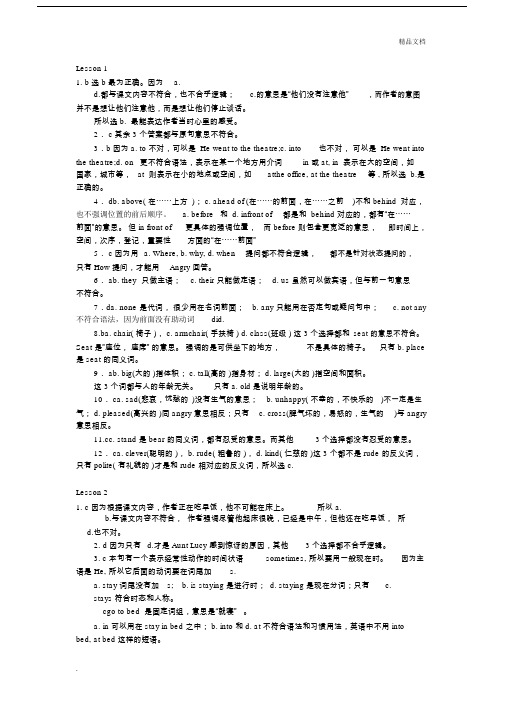
Lesson 11. b 选 b 最为正确。
因为 a.d.都与课文内容不符合,也不合乎逻辑; c.的意思是“他们没有注意他”,而作者的意图并不是想让他们注意他,而是想让他们停止谈话。
所以选 b. 最能表达作者当时心里的感受。
2. c 其余 3 个答案都与原句意思不符合。
3.b 因为 a. to 不对,可以是 He went to the theatre;c. into也不对,可以是He went into the theatre;d. on更不符合语法,表示在某一个地方用介词in 或 at, in 表示在大的空间,如国家,城市等,at 则表示在小的地点或空间,如atthe office, at the theatre等,所以选 b.是正确的。
4. db. above( 在⋯⋯上方 ); c. ahead of (在⋯⋯的前面,在⋯⋯之前)不和 behind 对应,也不强调位置的前后顺序。
a. before和 d. infront of都是和behind对应的,都有“在⋯⋯前面”的意思。
但 in front of更具体的强调位置,而before则包含更宽泛的意思,即时间上,空间,次序,登记,重要性方面的“在⋯⋯前面”5. c 因为用 a. Where, b. why, d. when提问都不符合逻辑,都不是针对状态提问的,只有 How 提问,才能用Angry 回答。
6. ab. they只做主语; c. their 只能做定语; d. us 虽然可以做宾语,但与前一句意思不符合。
7.da. none 是代词,很少用在名词前面; b. any 只能用在否定句或疑问句中; c. not any 不符合语法,因为前面没有助动词did.8.ba. chair( 椅子 ), c. armchair( 手扶椅 ) d. class(班级 ) 这 3 个选择都和seat 的意思不符合。
Seat 是”座位,座席” 的意思。
新概念英语第二册课后习题答案全

新概念英语第二册课后习题答案全一、练习册第1课至第10课课后习题答案1. Lesson 1: A Private ConversationAnswer Key:1. Yes, he did.2. He asked the woman to change her seat.3. She replied that she was in the middle.2. Lesson 2: Breakfast or Lunch?Answer Key:1. He wanted to buy a newspaper.2. He ordered breakfast.3. He thought it was too early for lunch.3. Lesson 3: Please Send Me a CardAnswer Key:1. He was in a small village.2. He sent a telegram to his wife.3. He was in a hospital.4. Lesson 4: An Exciting TripAnswer Key:1. They were in a bus.2. They were going to a village.3. They had a wonderful trip.5. Lesson 5: No Wrong Numbers1. He was waiting for a phone call.2. He was waiting for his uncle.3. He received a wrong number.6. Lesson 6: Percy ButtonsAnswer Key:1. He was an old man.2. He collected old coins.3. He had a valuable coin.7. Lesson 7: Too LateAnswer Key:1. They were late for the meeting.2. They missed the train.3. They had to take a taxi.8. Lesson 8: The Best and the WorstAnswer Key:1. He was a good swimmer.2. He was the best swimmer in the pool.3. He was the worst swimmer in the pool. Answer Key:1. He was a famous actor.2. He was in a small town.3. He was recognized a young man.10. Lesson 10: Not for Jazz1. He was a famous musician.2. He played the piano.3. He was not for jazz.二、练习册第11课至第20课课后习题答案11. Lesson 11: One Good Turn Deserves Another Answer Key:1. He helped an old lady.2. She helped him find his way.3. He was grateful to her.12. Lesson 12: Ask Me No QuestionsAnswer Key:1. He was a writer.2. He wrote a book about his adventures.3. He was very modest.13. Lesson 13: Going on HolidayAnswer Key:1. They were going on holiday.2. They were going to the seaside.3. They had a wonderful time.14. Lesson 14: Do You Speak English?Answer Key:1. He was a tourist.2. He was in a foreign country.3. He spoke English.15. Lesson 15: Good NewsAnswer Key:1. He was a doctor.2. He had good news for his patient.3. The patient was cured.16. Lesson 16: A Polite RequestAnswer Key:1. He was a customer.2. He wanted to buy a new car.3. He asked the salesman for help.17. Lesson 17: Across the ChannelAnswer Key:1. He was a swimmer.2. He swam across the English Channel.3. He was very tired.18. Lesson 18: Once a WeekAnswer Key:1. He was a doctor.2. He visited his patients once a week.3. He was very busy.19. Lesson 19: Sold OutAnswer Key:1. He was a customer.2. He wanted to buy a ticket.3. The ticket was sold out.20. Lesson 20: One Man in a BoatAnswer Key:1. He was a fisherman.2. He was alone in a boat.3. He caught a lot of fish.。
新概念英语第二册第一课包含课文练习及答案
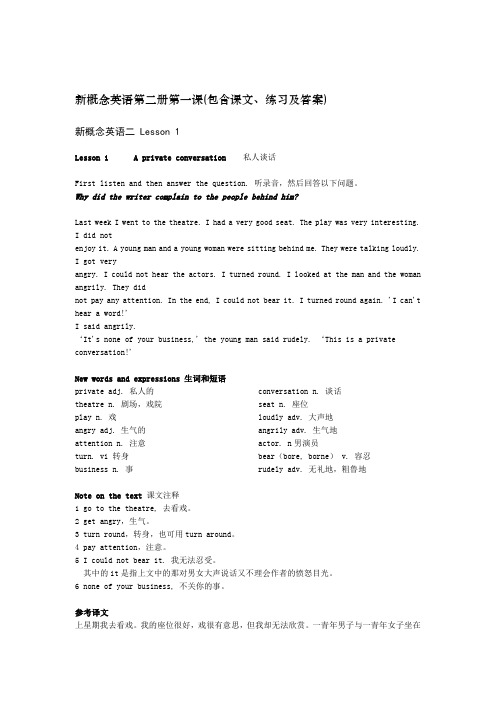
新概念英语第二册第一课(包含课文、练习及答案)新概念英语二 Lesson 1Lesson 1 A private conversation 私人谈话First listen and then answer the question. 听录音,然后回答以下问题。
Why did the writer complain to the people behind him?Last week I went to the theatre. I had a very good seat. The play was very interesting.I did notenjoy it. A young man and a young woman were sitting behind me. They were talking loudly.I got veryangry. I could not hear the actors. I turned round. I looked at the man and the woman angrily. They didnot pay any attention. In the end, I could not bear it. I turned round again. 'I can't hear a word!'I said angrily.‘It's none of your business,' the young man said rudely. ‘This is a private conversation!'New words and expressions 生词和短语private adj. 私人的 conversation n. 谈话theatre n. 剧场,戏院 seat n. 座位play n. 戏 loudly adv. 大声地angry adj. 生气的 angrily adv. 生气地attention n. 注意 actor. n男演员turn. vi 转身 bear(bore, borne) v. 容忍business n. 事 rudely adv. 无礼地,粗鲁地Note on the text 课文注释1 go to the theatre, 去看戏。
新概念英语第二册课后习题答案详解_and_单元测试答案(全)
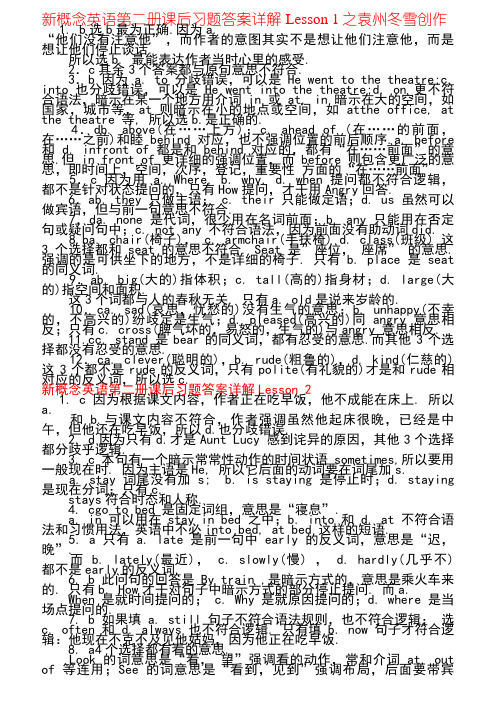
新概念英语第二册课后习题答案详解Lesson 1之袁州冬雪创作1. b选b最为正确.因为a.“他们没有注意他”,而作者的意图其实不是想让他们注意他,而是想让他们停止谈话.所以选b. 最能表达作者当时心里的感受.2.c其余3个答案都与原句意思不符合.3.b因为a. to 分歧错误,可以是He went to the theatre;c. into 也分歧错误,可以是He went into the theatre;d. on更不符合语法,暗示在某一个地方用介词in 或at, in 暗示在大的空间,如国家,城市等,at 则暗示在小的地点或空间,如atthe office, at the theatre 等, 所以选b.是正确的.4.db. above(在……上方);c. ahead of (在……的前面,在……之前)和睦behind 对应,也不强调位置的前后顺序.a. before 和 d. infront of 都是和behind对应的,都有“在……前面”的意思.但in front of 更详细的强调位置,而before则包含更广泛的意思,即时间上,空间,次序,登记,重要性方面的“在……前面”5.c因为用 a. Where, b. why, d. when 提问都不符合逻辑,都不是针对状态提问的,只有How提问,才干用Angry回答.6.ab. they 只做主语; c. their只能做定语;d. us 虽然可以做宾语,但与前一句意思不符合.7.da. none是代词,很少用在名词前面;b. any 只能用在否定句或疑问句中;c. not any 不符合语法,因为前面没有助动词did.8.ba. chair(椅子), c. armchair(手扶椅) d. class(班级) 这3个选择都和seat的意思不符合. Seat是”座位,座席”的意思. 强调的是可供坐下的地方,不是详细的椅子. 只有 b. place 是seat 的同义词.9.ab. big(大的)指体积;c. tall(高的)指身材;d. large(大的)指空间和面积.这3个词都与人的春秋无关. 只有a. old是说来岁龄的.10.ca. sad(哀思,忧愁的)没有生气的意思;b. unhappy(不幸的,不高兴的)纷歧定是生气;d. pleased(高兴的)同angry意思相反;只有c. cross(脾气坏的,易怒的,生气的)与angry 意思相反.. stand 是bear的同义词,都有忍受的意思.而其他3个选择都没有忍受的意思.12.ca. clever(聪明的),b. rude(粗鲁的),d. kind(仁慈的)这3个都不是rude的反义词,只有polite(有礼貌的)才是和rude相对应的反义词,所以选c.新概念英语第二册课后习题答案详解Lesson 21. c因为根据课文内容,作者正在吃早饭,他不成能在床上. 所以a.和 b.与课文内容不符合,作者强调虽然他起床很晚,已经是中午,但他还在吃早饭,所以d.也分歧错误.2. d因为只有d.才是Aunt Lucy 感到诧异的原因,其他3个选择都分歧乎逻辑.3. c本句有一个暗示常常性动作的时间状语sometimes,所以要用一般现在时. 因为主语是He, 所以它后面的动词要在词尾加s.a. stay 词尾没有加s;b. is staying 是停止时;d. staying 是现在分词;只有c.stays符合时态和人称.4. cgo to bed 是固定词组,意思是“寝息”.a. in 可以用在stay in bed 之中;b. into 和 d. at 不符合语法和习惯用法,英语中不必into bed, at bed 这样的短语.5. a只有 a. late 是前一句中early的反义词,意思是“迟,晚”.而 b. lately(最近), c. slowly(慢) , d. hardly(几乎不) 都不是early的反义词.6. b此问句的回答是By train ,是暗示方式的,意思是乘火车来的. 只有b. How才干对句子中暗示方式的部分停止提问. 而a.When是就时间提问的; c. Why是就原因提问的;d. where 是当场点提问的.7. b如果填a. still句子不符合语法规则,也不符合逻辑;选c. often 和d. always 也不符合逻辑. 只有填b. now句子才符合逻辑:他现在不克不及见他姑妈,因为他正在吃早饭.8. a4个选择都有看的意思.Look 的词意思是“看,望”强调看的动作,常和介词at, out of 等连用;See 的词意思是“看到,见到”强调布局,后面要带宾语;Watch的词意思是“观看,注视”多用来指看戏剧,电视节目等,是及物动词,如watch TV, watch a play;Remark 的词意思是“注意到,察觉到”也强调成果.本句中只有选looked,意思才完整:他向窗外张望,看到外面在下雨.9. da. at once 和 b. immediately 都是“立即,顿时”的意思;c. again是“再一次”的意思;只有 d. atthe moment 同前一句中的just then意思相接近,所以选d.10. ca. son, b. grandson , d. niece 都不克不及标明他和他姑妈的关系,只有选c.nephew才干准确说明他们的关系.11. da. food(食品),b. dinner(正餐) ,c. lunch(午餐) 这3个词都不克不及同breakfast 划等号. 只有d.a meal(一顿饭) 可以等同于breakfast, 所以应该选d.12. b本句中的”Dear me”是感叹句,暗示吃惊. 只有选 b. surprised 才干使这个句子符合逻辑,而其他3个词都没有吃惊的意思.新概念英语第二册课后习题答案详解Lesson 31. c根据课文可以断定出作者不喜欢写明信片,但他很想收到他人寄来的明信片,所以应该选c.d. doesn’t like postcards 不喜欢明信片,和课文的含义不符合,所以不选d.2. a根据课文最后两句话可以断定出:作者作出的“一项重大决议”是给他的朋友们写明信片,可是还是一张没有写成,所以应该选a.3. ca. at 暗示在小的地点和空间;b. to 暗示方向;d. on 暗示在……上;只有 c. in 暗示在大的空间和地方,如城市国家等,所以选c.4. a只有选a. Who taught ,这句问话才与回答相配.5. d只有选d. in a friendly way(以友好的方式)才干说明前一句He was a friendlywaiter,也合乎语法和逻辑.而其他3个 a. friend(朋友), b. as friends(作为朋友),c. likefriends(像朋友一样)在语法上都讲欠亨.6. b本句的时态是一般过去时,应该用动词的过去式形式;a. reads 是第3人称蛋单数现在时形式;c. red 词意思不符合;d. reading 是现在分词形式;b. read 过去式和现在式形式相同,发音分歧.所以只有选b.7. ca. the hole 词意思分歧错误;b. the ball 和 d. all of 分歧乎习惯用法;英语中不必the all day, all of day这样一来的短语. 只有选 c. all 才干使句中的词组all day 同前一句中的the whole day 意思相同.8. c句中的waiter 是“饭店服务员”的意思,他通常在饭店工作,而不在a. public garden(公园),b.shop(商店),d. private house(私宅) 工作,所以选 c. restaurant.9. b只有 b. borrowed 才与前一句中的lent相对应,而其他3个选择都不是. 英语中的borrow 和lend都有“借”的意思,但是borrow是“向……借”,而lend则是借给.10. ab. end(最后,竣事)有名词和动词词性,不克不及用在名词前修饰名词.c. latest (最近的)不符合意思.d. bottom(底部)是名词,不克不及修饰名词只有 a. final(最后的)才干使句子的意思成立.11. b只有b. made up his mind(下决计)才同前一句中的made a big decision 意思相近. 而其他3个选择a. thought about it (思索),c. changed his mind(改变主意),d. made awish(立下心愿)都没有下决计的意思.12. b只有b. didn’t write even one(连一张也没有写)与前一句中的didn’t write a single card意思相同,而a. wrote only one, c. wrote just one, d. wrote all the cardsexcept one 都与其意思有别.新概念英语第二册课后习题答案详解Lesson 41. d根据课文内容Tim is an engineer. He is working for a big firm..., 只有 d. Timis working for a big firm as an engineer 是对的,其他3个与文章不符合.2. b根据课文的最后一句My brother has never been abroadbefore…,应该选b.其他3个选择都与课文内容不符合.3. ab. in(在……外面)不克不及和动词go连用;c. at(在……地方)也不克不及同go 连用;d.into(进入……内)可以与go连用,但是到某个国家不克不及用go into;只有a. to 同动词go 连用 go to才干暗示到某个地方去,如国家,城市等,所以选a.4. b本句是问“他在那儿呆了多久”.因为说话时他还在那,所以应该用现在完成时态.a. is he 是一般现在时;c. has he 中没有过去分词been, 不符合语法;d. was he 是一般过去时;只有b.has he been 是现在完成时, 所以选b.5. ba. for 只有同暗示一段时间的词连用时候才干用在完成时中,如for six months, for one year等.c. from 常与介词to连用暗示"从……到……",它很少用于现在完成时;d. by 可以暗示时间“到……为止”,常常使用于过去完成时中和将来完成时中,但是它用在本句意思分歧错误;只有b.since(从……以来)可以用在完成时态中,选b.才干使句子的时态和意思正确而且合乎逻辑.6. a本句的意思是“他刚刚买了一辆澳大利亚小汽车”强调买的时间短,用just来暗示.b. a long time ago(很久以前)与原来句子不符合.c. last year(去年)也跟原来句子不符合.d. six months ago(6个月前)也分歧错误,句子中没有明白说明;只有a. a short time ago(不久前,最近)同just的意思相近,所以应该选a.7. c本句需要用现在完成时,已经给出了助动词has,只需要填上过去分词便可以了.a. went 是过去式; b. being 是现在分词;d.was 是过去式,只有c. been 是过去分词,所以选c.8. b本句需要选出与firm(公司)的同意义词. 只有 b. company(公司)和firm 的词意思相同. 而其他3个a.society(社会),c. factory(工厂),d. store(商店)都不是firm 的同意义词,所以选b.9. c本句需要选出一个与前一句的different相对应的词.a. the only (唯一的)不是different的反义词. b. asimilar (相似的,近似的)也有同样的意思,但是它不是和different相对应的反义词;d.alike(相象的,相同的)通常做表语. 只有c. the same(同一的,同样的)是different的反义词,所以应该选c.10. a只有 a. bigger than a village but smaller than a city才干准确表达town的含义,而其他3个选择都不暗示这个意思.11. c本句需要选出一个同前一句soon(不久)意义相接近的词,a. quickly(疾速地),b. for a shorttime(短时间),d. in a hurry(匆忙地)这3个选择都与soon意思分歧,只有c. shortly(不久)是soon的同义词.12. c本句需要选出同前句中fly(飞,乘飞机)的意思相应的短语.只有c. by air 是固定短语,暗示方式, go by air 是惯用法,意思是“乘飞机去”,而a. with air, b.in air, c. through air 都不是固定短语,意思都讲欠亨,所以选c.新概念英语第二册课后习题答案详解Lesson 51. c根据课文底第3行but Mr. Scott cannot get a telephone for his new garage断定,只有c. He cant get one 是对的.2. a根据课文内容,养鸽子的目标是为了传递信息,只有 a. he uses them to send messages与课文的意思相同,而其他3个选择都没有这种含义.3. dd. his 既可以做所有格形容词又可以做所有格代词,意思是他的,相当于一个名词,本句只有选d. 句子The garage is his才符合语法.4. ba. that's so(真的,是那样);c. because(由于,因为)常常使用来引导原因状语从句; d.for(由于……的缘故,因为)用于提出证据或说明.本句只有选 b. That'swhy(这就是为什么)才可以说明来由,与前一句构成因果关系,而其他3个选择都不符合逻辑.5. c本句是一般过去时的疑问句,句中已经给出助动词did,只需要填一个动词原形即可. 只有c. buy 是动词原形,其他3个都不是.6. d本句是针对间隔的远迩来提问的.A. long ago... until 不是说明间隔的, long ago从和睦until连用; b.long …away 是说明间隔的,但应该是long…away from…; c.away…till 中away 不该该和till连用,不符合习惯用法,从意义上讲欠亨;只有 d. far… from (离……远)是说明间隔远近的,符合英语中惯用法,所以选d.7. a本句需要选一个介词用在three minutes 之前,暗示所用的时间. 只有a. in合适,而其他3个选择都不克不及和threeminutes 构成暗示时间的短语,所以选a.8. b本句需要选暗示“另外一个”意思的词修饰garage.a. another(adj.) 有另外一个的含义,但它前面不克不及带其他的修饰词,如冠词,所有格形容词等;c.else(adj.其他的,此外,别的)做形容词时应该放在它所修饰的词和代词之后;d.different(adj.分歧的)与题目意思不符合;只有 b. other(别的的,其他的)可以带其他的修饰成分,如the, his等,也可以用在名词前面,所以选b.9. c本句需要选出一个与前一句中的动词get 意思相同的词.a. take(拿去,携带)b. receive(收到),d.find(发现,找到)都不是get 的同义词.,只有 c. obtain(获得),所以选c.10. b本句需要选出与前一句的动词短语send requests for 的意思相同的词或短语.a. asked(问,打听); b. askedfor(请求),c. begged(乞讨),d. pleased(喜欢,使……高兴),只有 b.有请求的意思,意思最接近,所以选b.11. a本句主要想说明告急信函应如何发出. B. slowly(渐渐地)与题目意思相反;c. by hand(用手)不符合题目意思;d.largely(许多,大量)更不符合题目意思;只有 a. quickly(疾速地)符合题目意思.12. d本句是要诠释前一句中的private(私人的,私有的).a. general(普遍的,全体的);b. spare(多余的,闲暇的),c.secret(奥秘的,私下的,神秘的);这3个选择都与private意思不符合,只有d. hisown(他自己的)词意思最接近,所以选d.新概念英语第二册课后习题答案详解Lesson 61. d根据课文第2-3行In return for this , the beggar stood on his head…, 只有 d. hewanted to ‘pay’ for his meal in this way,才干准确表达他这样做的原因,而其他3个选择都不克不及说明这个原因.2. a根据课文第一句I have just moved to a house in Bridge Street, 只有a. She wasnew to the neighbourhood与课文意思最接近,其他3个选择都和课文的意思不符合.3. ca. at house, b. to the house, d. in the home 都不符合习惯用法. 只有 c. at home在家,是习惯用法,所以正确答案是c.4. d只有选 d. a meal to him 这个句子才符合语法,而其他3个选择都有语法错误,依照习惯用法,应该是give sb. sth.或 give sth. to sb.5. da. told 后面少间接宾语,句子意思不完整;b. said me 语法不正确;c. told to me中间接宾语应紧跟在动词后面,不需要加to;只有选d. said 才符合语法,它后面可以跟宾语从句,习惯用法为tell sb. sth.或 tell sth. to sb.6. a只有选a. They all 才干使句子语法正确,意思完整,其他选择都在语法上讲欠亨.如each做主语,后边的动词应为单数第三人称,Every 为形容词不克不及做主语,依照习惯用法all of them才可做主语.7. d这一问句是针对打电话“间隔的时间”或“频率”提问,因此用 a. How seldom, b. how long, c. How soon提问都不克不及用Once a month(每个月一次)往返答,只有用d. How often 提问才干用Once a month往返答.8. a只有a. asks for money but doesn'twork(只要钱但不工作)才干准确表达beggar(乞丐)这个词的含义,其他3个都不克不及正确表达这个意思.所以选a.9. ba meal(一顿饭)是泛指,可以是早餐、午餐或晚餐.因此应该选b. at anytime(在任何时候),而其他3个选择意思都不敷准确.10. a本句需要选出与前一句中的piece(小块,片)意思相接近的词, b. bar 长块, c. block 大块,d.packet小包,这3个都不克不及准确表达piece 的含义.只有 a. bit 小片,少许,同piece 意思最接近,所以选a.11. d本句需要选出与前一句中的短语call at (访问某家或某地)的意思相同的词.a. shouts at(呼喊);b. calls(召唤,打电话);c. cries out(对……大喊)这三个选择意思都不恰当,只有d. visits(访问,访问)和calls at 是同义词.12. a本句只有选 a. street 才符合英语习惯用法,b. way 不符合题目意思. c. road, d .route不符合习惯用法,在意思上欠亨.新概念英语第二册课后习题答案详解Lesson 71. b根据课文第3-4行someone had told the police that thieves would try to stealthe diamond 和第8-9行While two detectives were keeping guard at thedoor…可以断定出 b. to prevent a robbery 是正确答案,其他3个都分歧错误.2. c根据课文最后一句话To their surprise, the precious parcel was full of stonesand sand! 可以推测出 c. didn’t prevent the robbery 是正确的答案.其他3个选择都不符合课文内容.3. c从回答中可以看出,此问句是对地点发问的, a. Why, b. When, d. What 都不克不及针对地点提问,只有 c. Where是问地点的,可以用At the airport 往返答,所以选c.4. d这一句是针对动词宾语提问的,回答是用名词短语 A valuable parcel of diamonds . a. Why, b.When , C. where 这几个疑问词都不克不及针对动词宾语(名词)提问的,只有d. What 可以对名词提问.5. a前面句子是过去完成时(hadtold),暗示在过去某一动作或情况发生之前完成的事情,“或人告诉差人....”这一事件一定是在“飞机到达之前”发生的.所以正确答案选a. before(在……之前)6. ca. in后面需要有一个暗示地点的名词,意思才完整;b. into在意思上讲欠亨;d. for 后面需要有一个名词做宾语,意思才完整;只有c. inside(在外面)意思最完整,而且与前半句的动作went into the building相符合,所以选c.7. d4个选择中只有d. took it off 最符合题目意思和语法,所以选d.8. ab. waiting 是不及物动词,后面不克不及直接跟名词;c. expecting for 中的expect是及物动词,后面不克不及加for; d. expecting to 中expect后面不克不及加to; 只有a. expecting最符合语法.9. c本句需要选一个与前句中的valuable(贵重的,珍贵的)意思相同的形容词做表语.a. worth 可以做名词和形容词,意思是“价值”,“值得……的”,不是valuable的同义词;b. worthy 是形容词,意思是“有价值的”“值得的”常于of 或不定式连用,不克不及单独做表语,也不是valuable的同义词;d. value 是名词,不符合词性;只有c. precious 是形容词,意思是“贵重的”,“珍贵的”,是valuable 的同义词,可以做表语,所以选c10. bc. take from ,d. take to 都不符合语法;a. rob 和b. steal都有“窃取”的意思,但steal强调“偷偷地或悄悄地趁人不注意时窃取”,而rob则强调“通过武力明火执仗地盗窃或抢劫”.Steal这一动作的执行者应该是thief(小偷),而rob的动作执行者却是robber(强盗).因为本句的主语是thethieves,所以选b.11. a本句是要诠释前一句中的 the main building(主楼),b. smallest(最小的);c. first(第一);d.greatest(最伟大的)这3个选择都不符合词义,只有 a. most important(最重要的)意思与themain意思最接近,所以应该选a.12. b本句如果选a. full with, c. full by, d. full in 都有语法错误,full 只能同of连用,暗示“充满……的”,因此选 b. full of.新概念英语第二册课后习题答案详解Lesson 81. d根据课文的头一句和最后一句,只有d.是正确答案,其他3个选择都与课文内容不符合.2. b根据课文第6-7行I like gardens too, but I do not like hard work可以推测b.是正确答案,其他3个选择都与事实不符合.3. ba. larger garden 前面没有冠词a,分歧乎语法;c. large garden 前面也缺少冠词a,d. largest garden中最高级前面应该有定冠词the,而且在二者相比时也不克不及使用最高级.所以只有b. a large garden 最符合语法.4. a本句需要比较级形式. B. more hard 中的hard 是单音节词,其比较形式是在词尾加-er; c. more hardly 中hardly(几乎不.....)词意思分歧错误;d. hardier 中原形hardy 是暗示“强壮的”与课文不符合;只有a.harder 最符合比较级形式.5. ca. by, b. for , d. from 都不克不及同比较级连用,只有c. than 才可以和比较级连用.6. c应该选同前一句The writer is fond of garden 意思相近的句子. A. They like him意思同前一句相反; b. they like to him 有语法错误,也同前一句意思不符合;d. He likes有语法错误,缺少宾语;只有c. He likes them 意思最接近,没有语法错误.7. ba. in , c. for, d. by 都不符合语法,在意思上也讲欠亨. 只有b. of 才干使句子的意思完整,也合乎语法.8. ba. wins(获胜,获奖)做及物动词时,它后面的宾语一般不是人,而应是wind the game/race等;c.gains(获利,赚得)后面的宾语也不是人;d. earns(挣得,获得)后面的直接宾语也不该该是人;只有b. beats有“(在比赛中)打败/战胜/取胜”的意思,而且beat 后面的宾语可以是人,所以选b.9. a只有选 a. grow 才干使这个句子同前面的句子意思相同. Grow 可以做及物动词也可以做不及物动词. Grow做及物动词时,意思是“种植,栽培”,如前面的句子Joe grows more flowers. Grow做不及物动词,意思是“生长,发生”这个句子若选grow, More flowers grow in his garden(他的花园里生长更多的花)同前面句子意思最接近. 而 b. grow tall, c. grow up, d. grow big意思都不敷准确.10. d只有选 d. interested 这个句子在意思上才讲得通. Be interestedin….是固定短语(对……感兴趣),主语一般是人.a. interesting(有趣的)做表语的时候主语应该是物,如前一句Joe’sgarden is interesting; b. interest (n.兴趣,好处) 不克不及做表语; c.interestingly(有趣地)也不克不及做表语.11. ba. a hard work 不符合语法,因为work 作“工作”讲时是不成数名词,不克不及在它前面加不定冠词a;c. hard job 也不符合语法,因为job 是可数名词,前面应该加不定冠词a;d. hardly a job 在意思上讲欠亨,不符合题目意思;只有b. a hard job (一项艰苦的工作)最合乎语法和题目意思.12. ba. very(非常)丰富不符合题目意思,它也不克不及放到句尾;c. and 放在句尾没有任何意义;b. also 和 d. either都有也的意思,但either只能用于否定句的句尾,also可以用于必定句中,它可以放在谓语动词前也可以放在句尾,所以选b.新概念英语第二册课后习题答案详解Lesson 91. b根据课文内容第1-2行 It was the last day of the year…和第8行The big clockrefused to welcome the New Year, b 最符合课文内容,其他3个选择都分歧错误.2. b根据课文第4行...at five to twelve, the clockstopped.钟是在午夜前停的,但人们是在午夜后才意识到这一点的.(It's two minutes pasttwelve!第6-7行),所以b.是对的.a. before midnight 和课文事实不符合. 钟是在午夜前停的,但人们是在午夜后才意识到这一点的.3. dthe evening 前需要有介词in才干构成暗示时间的短语,所以选d.其他3个选择都分歧错误.4. apeople 是集体名词,虽然形式是单数,但意思是复数的(人平易近或人们),做主语时候谓语动词要用复数形式. B. was, c. is ,d be 都不克不及用在people 后面做谓语动词,只有a. were 可以,所以选a.5. a这个问句的回答是一个暗示时间的短语,因此需要一个针对时间提问的疑问词.只有a. when是针对时间提问的,而其他3个都不是问时间的.6. b在暗示钟点的时间短语前面用介词at,所以只有b. at 是对的.7. b从回答中可以看出,这个疑问句需要一个可以针对nothing 提问的词,而且要可以在疑问句中充当主语.a.nothing可以做主语,但一般不必在疑问句中;c. any 是量词,不克不及做主语;d. athing可以做主语,用在这个问句中意思虽然通顺,但不符合习惯用法;b. anything是不定代词,可以做主语,而且只能在疑问句中做主语,所以b.是对的.8. da. hit , b. beat, c. knock , d. strike这几个动词中都有“敲”,“打”,“击”的意思,但是只有strike 有“(钟表)敲鸣”,“报时”的含义,所以最佳选择是d.9. b本句暗示钟点的短"几点过几分"中只能用介词past,所以只有b. past 是正确的答案.c. passed 分歧错误,是动词pass的的过去式,一个句子里不克不及有两个谓语动词的.pass是动词,而past是介词,有时用作形容词或名词.当pass用作动词和past用作介词时,它们都有“过去”和“颠末”的意思.Three months passed and then one morning, Sam found his walletoutside his front door.三个月过去了,后来有一天上午,山姆在自己前门的外面发现了自己的钱包.It's two minutes past twelve.现在是十二点过两分.10. b只有b. an hour 是正确答案,其他选择都不符合事实.11. d根据生活知识应该选 d. watch(手表),这个句子的意思是“大多数人带手表”,这是事实.而选 a. an alarmclock(闹钟)或 c.a clock(钟表)都与事实不符合,人们总不成能随身携带着闹钟或钟.而选b. analarm(报警器)更不符合事实.12. c只有选c. didn’t want to (不想)才干使这个句子同前面的句子It refused to …的含义接近.b. wanted to (想要) 和d. wished to (希望)都与前面句子意思相反.a. denied it (否认,回绝承受)也同前一句意思不敷接近.新概念英语第二册课后习题答案详解Lesson 101. a根据课文第3行It has belonged to our family for a long time. 只有a. has beenin the family for a long time 是正确的,其他3个选择都不符合课文内容.2. d根据课文中第5-6行She struck the keys too hard and two of the strings werebroken, 只有 d. She hit the keys too hard 最符合课文内容. A. She played jazzon it 是事实,但是不克不及详细说明钢琴损坏的原因;b. she played it 更不克不及说明钢琴损坏的原因;c. She cutthe strings 与事实不符合.3. d本句需要选同前面句子中的is kept 相应的主动语态形式.a. kept 是过去式,b. have kept 是现在完成时形式,c. are keeping是现在停止时,这3个选择都在时态上与is kept 不符合.只有d. keep 是一般现在时形式,与is kept时态一致,所以选d.4. c本句需要选名词的所有格形式. a. families 是复数形式,而不是所有格形式;b.families’是所有格形式,但不该该是复数;d. familys’写法错误;只有c. family’s 是所有格形式,最符合尺度.5. ba. since c. from d. by 都不克不及用来引导暗示一段时间的短语,都不克不及用在many years 前,只有b. for可以引导暗示一段时间的短语,所以选b.6. c这个问句的回答是Grandfather did, 是一般过去时,需要为疑问句选一个过去式的动词. A. buy 是现在式;b. wasbought 是过去式,但语态分歧错误; d. did buy 用Who提问时不该该用助动词did; 只有c. bought是过去式,最符合语法.7. a本句需要选一个可以进一步说明前面句子中的are not allowed to 的词. B. mustn’t to 分歧乎语法,must后面不克不及有带to的动词不定式;c. haven’t to 分歧乎语法,在意思上讲欠亨;d. don’t have to虽然合乎语法,但意思分歧乎题目意思. Have to 是必须,不克不及不的意思,其否定形式是“不必”. 只有a.mustn’t(不该该)最合乎语法,其意思也最符合题目意思.8. ca. told , b. said, d. spoken 都有“说,讲”的意思,都不符合题目意思,只有c.called(称做,叫做)最合乎题目意思.9. a只有选 a. 这个句子的意思才接近前一句的含义,而 b. hold(握着),c. lift(提起),d.carry(拿着)都分歧乎题目意思,所以选a.10. c要找出与前面句子中的damaged(损伤,损坏)意思相近的词.a. hurt(伤害,使伤心)一般指精力上的,情感上的或指对身体某一部位的伤害,不是damage的同义词.b. pained(使疼痛,使痛苦)也不是damage的同义词.d. destroyed(毁坏,摧毁建筑物等)不是damage的同义词.。
新概念英语第二册全册课后习题答案详解及单元测试答案
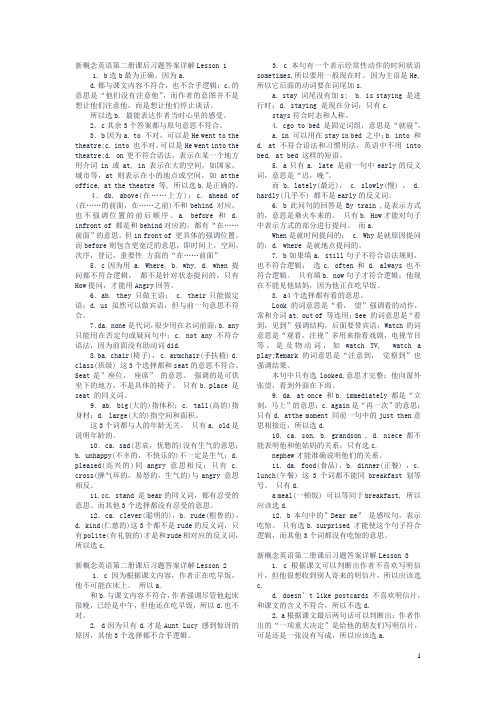
新概念英语第二册课后习题答案详解Lesson 11. b选b最为正确。
因为a.d.都与课文内容不符合,也不合乎逻辑;c.的意思是“他们没有注意他”,而作者的意图并不是想让他们注意他,而是想让他们停止谈话。
所以选b. 最能表达作者当时心里的感受。
2.c其余3个答案都与原句意思不符合。
3.b因为a. to 不对,可以是He went to the theatre;c. into 也不对,可以是He went into the theatre;d. on更不符合语法,表示在某一个地方用介词in 或at, in 表示在大的空间,如国家,城市等,at 则表示在小的地点或空间,如atthe office, at the theatre 等, 所以选b.是正确的。
4.db. above(在……上方);c. ahead of (在……的前面,在……之前)不和behind 对应,也不强调位置的前后顺序。
a. before 和 d. infront of 都是和behind对应的,都有“在……前面”的意思。
但in front of 更具体的强调位置,而before则包含更宽泛的意思,即时间上,空间,次序,登记,重要性方面的“在……前面”5.c因为用 a. Where, b. why, d. when 提问都不符合逻辑,都不是针对状态提问的,只有How提问,才能用Angry回答。
6.ab. they 只做主语; c. their只能做定语;d. us 虽然可以做宾语,但与前一句意思不符合。
7.da. none是代词,很少用在名词前面;b. any 只能用在否定句或疑问句中;c. not any 不符合语法,因为前面没有助动词did.8.ba. chair(椅子), c. armchair(手扶椅) d. class(班级) 这3个选择都和seat的意思不符合。
Seat是”座位,座席”的意思。
强调的是可供坐下的地方,不是具体的椅子。
新概念英语第二册 试卷及答案
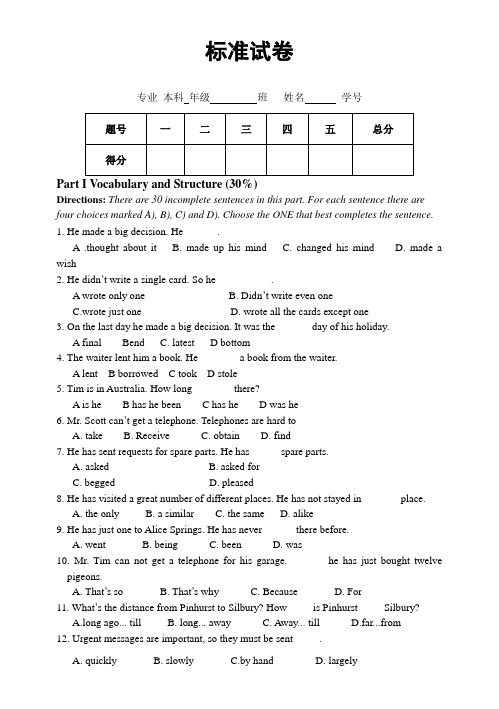
标准试卷专业本科年级班姓名学号Directions:There are 30 incomplete sentences in this part. For each sentence there are four choices marked A), B), C) and D). Choose the ONE that best completes the sentence.1. He made a big decision. He ______.A .thought about it B. made up his mind C. changed his mind D. made a wish2. He didn’t write a single card. So he __________.A wrote only one B. Didn’t write even oneC.wrote just oneD. wrote all the cards except one3. On the last day he made a big decision. It was the ______ day of his holiday.A final Bend C. latest D bottom4. The waiter lent him a book. He _______ a book from the waiter.A lentB borrowedC tookD stole5. Tim is in Australia. How long _______ there?A is heB has he beenC has heD was he6. Mr. Scott can’t get a telephone. Telephones are hard to_______A. takeB. ReceiveC. obtainD. find7. He has sent requests for spare parts. He has _____ spare parts.A. askedB. asked forC. beggedD. pleased8. He has visited a great number of different places. He has not stayed in_______ place.A. the onlyB. a similarC. the sameD. alike9. He has just one to Alice Springs. He has never______ there before.A. wentB. beingC. beenD. was10. Mr. Tim can not get a telephone for his garage. _______he has just bought twelve pigeons.A. That’s soB. That’s whyC. BecauseD. For11. What’s the distance from Pinhurst to Silbury? How ____ is Pinhurst ____ Silbury?A.long ago... tillB. long... awayC. Away... tillD.far...from12. Urgent messages are important, so they must be sent ____ .A. quicklyB. slowlyC.by handD. largely13. Mr. Button’s telephone service is private. It is ____ .A. generalB. spareC. secretD. his own14. She gave____A. to him a mealB. a meal for himC. him to a mealD. a meal to him15. Everyone knows him. ____ know him.A. The allB. EachC. EveryD. All they16. You can have a meal ____ .A. only in the morningB. at any timeC. only at middayD.only in the evening17.All the housed in our ____ are the same age and size.A. streetB. wayC. roadD. route18. Joe’s garden is the best in the town. It’s the best _____ them all.A. in B of C. for D by19. _____, it is an important book.A. By the wayB. On the wayC. In the wayD. In a way20. What ‘s it _____ ? A clavichord.A. told B said C called D spoken21. The family have had he clavichord _____ many years.A. since B for C from D by22. ______I was looking for it, the inn-keeper came in.A. BecauseB. WhileC. ButD. Even if23. They are not allowed to watch TV _____ the week.A. on B .at C.during D. for24.____ does he call? Once a month.A. How seldomB.How longC. How soonD.How often25. The detective were _____ a valuable parcel of diamonds.A. expectingB. waitingC. expecting forD. expecting to26. Someone had filled the parcel with stones and sand. It was _____ stones and sand.A. full withB. full ofC. full byD. full in27. Two men took the box off the plane. They _____ .A. took off itB. it took offC. took offD. took it off28. The thieves wanted to _____ the diamonds.A. robB. stealC. take fromD. take to29. Joe wins every time. He always _____ Bill Frith.A. winsB. beatsC. gainsD. earns30. Mary’s garden is interesting. She is _____ in gardening.A. interestingB. interestC. interestinglyD. interestedPart II Translation (20%)Directions: Translate the following phrases into Chinese or English.31. 到现在为止36.it’s none of your business.32.我不能忍受37.a few words33.多么糟糕的一天! 38. turn around34.脱下外套39.Dear me!35.许多(修饰复数可数名词)40. in the centre ofPart III Fill the blanks with prepositions(介词) (10%)41. He went ___ America six months ago.42. He will go there _____ air.43. _____ Wednesday evening, we went to the Town Hall.44. _____ return for this, the bagger stood on his head and sang song.45. Please write an essay _____ English.Part IV Reading Comprehension (30%)Directions: There are 2 passages in this part. Each passage is followed by some questions or unfinished statements. For each of them there are four choices marked A), B) C) and D). You should decide on the best choice and mark the corresponding letter on the Answer Sheet with a single line through the center.Passage OneOne day a big rock(岩石)fell down from a mountain. The rock stopped in the middle of the road in a village. It was like a big ball. Some of the strongest men in the village tried to move the rock. But no matter how hard they tried, they couldn't move it away. They tried to push it; they tried to roll it and they tried to pull it with a rope, but nothing worked."Well" they agreed, "there's nothing we can do about it. We'll have to build another road. "At this time, a young boy of about 12 years old said, "Excuse me, sirs, but I think I can help you move the rock. ""You?" they shouted, "What are you talking about? All of us have just tried and we can't move it at all.” The men all laughed at the boy.The next morning some people came into the street. One of them shouted, "The rock is gone!" More people ran out into the street to see for themselves. It was true, and no one could see it anywhere."It is impossible, where has it gone?" they said. The boy stood out, saying "I did it last night. I dug a deep hole next to the rock and the rock rolled down into the hole by itself. Then I covered it with earth. "46. Where was the big rock from? ________A. a streetB. a mountainC. a hillD. a tree47. Why did the people in the village want to move the rock away? Because________ .A. it was in the middle of the roadB. it was on the mountainC. they didn't like the rockD. they wanted to build a road48. What did the people decide to do when they were not able to move the rock away?They decided to________A. find someone stronger to help themB. ask a little boy of 12 to help themC. build another roadD. break the rock49. Why did the people laugh at the boy? They thought that_____.____A the boy was too weak to move the rock awayB the boy was so strong that he could move the rockC. the boy was very helpfulD. it was easy for him to move the rock50. The next morning the people in the village found the rock _________A. disappearedB. was still thereC. was back on the mountain againD. was rolling down from the mountainPassage TwoSome ants(蚂蚁)make their homes under a stone. If the weather is warm, you may see many ants under the stone. If the weather is cold, many ants will be in their house under the ground.Most of the ants are workers. They are very busy. They look for food and take care of the young ants. Each family of ants has a queen ant(蚁后). The queen ant doesn't work. She is important because she lays eggs. Those eggs will become baby ants.There are many kinds of ants in America. One kind of these is very strong. People are afraid of it, and animals are afraid of it, too.These ants move in groups. They eat all the animals on their way. They can kill and eat elephants, and they can eat wooden houses. When the ants come near, people leave their homes. But people are sometimes glad after the ants pass through, because they will see no other insects or snakes.51. Where can you find ants on warm days? ________A. Under the ground.B. On the ground.C. Inside people's houses.D. Under a stone.52. Why is a queen ant more important than a worker ant? Because ___________A. a queen ant produces the youngB. a queen ant is stronger than all the other family membersC. a queen ant finds food for all the other family membersD. a queen ant does more work than all the other family members53. Where can you find many kinds of ants according to the passage? ________A. In America.B. In China.C. In Canada.D. In Britain.54. Why are people glad after the dangerous ants pass through? ________A. Because they are goneB. Because they are not dangerous any moreC. Because there are no other insects or snakesD. Because the ants can be eaten55. Which of the following is true? ________A. People are not afraid of any kind of ant.B. Big animals are not afraid of any kind of ant.C. An elephant can kill and eat a kind of very strong ant.D. One kind of ants moves in groups.Passage ThreeTom Green spent his 114th birthday the other day and some reporters visited him to find out the secret of a long life.“The secret of a long life is happiness,” Green said. “If you are happy, you will live a long time.”“Are you married?” a reporter asked. “Yes,” Green answered. “I married my third wife when I was 102. If you are happily married, you will live better. But for(要不是)my third wife, I would have died years ago.”“What about smoking and drinking?” another reporter asked. “Yes, they are important,” Green said. “Don’t smoke at all and you will feel well. Drink two glasses of wine a day and y ou will be healthy and happy. ”56.Some reporters visited Green because________A. he did something peculiarB. he was a friend of themC. he had lived much longer than most peopleD. he had married three times57. Green thought that________ was the most important to life.A. his third wifeB. gladC. happinessD. smoking58. Green thought his third wife helped him to live________ years longer.A.12B.14C.16D.1859. The writer wants to tell us________A. drinking a great deal is good for our healthB. drinking within a limit is helpfulC. smoking and drinking are indispensable(不可缺少的)to good healthD. we should quit smoking or drinking.60. The best title for this passage is________A. Drinking and SmokingB. The Secret of a Long LifeC. Happiness in LifeD. Astonished ReportersPart V Writing (10%)Directions: For this part you are allowed thirty minutes to write a composition on the topic The Use of Computers in Schools. Your composition should be no less than 120 words and based on the outline (given in Chinese) below:1. 学生越来越多地使用电脑的好处。
(word完整版)新概念英语第二册答案详解

(word完整版)新概念英语第二册答案详解新概念英语第二册答案详解每课的选择题:Lesson 1: bcbdc adbac ccLesson 2: cdcca bbadc dbLesson 3: cacac bccba bbLesson 4: dbabb acbca ccLesson 5: cadbc dabcb bdLesson 6: dacdd adaba daLesson 7: bccda cdacb abLesson 8: dbbac cbbad bbLesson 9: cbdaa bbdbb dcLesson 10: addcb cacac caLesson 11: bbbab ccacc bdLesson 12: ccadd adacd aaLesson : 13 bdbca bbcaa adLesson 14: bcacd bcbcb bbLesson 15: dbcbc dadcc cbLesson 16: aadab adadd daLesson 17: dbbdc cbaac adLesson18 : Bdbdb cdcac cbLesson 19: Adccd bcbca ccLesson 20: Bcbbc bcacc daLesson 21 : cdcda cbbad ccLesson 22: dbddb dacda bbLesson 23: aaacc addbb adLesson 24: baaca acccb abLesson 25: cbbab cdbaa daLesson 26: adcbc ddabd bdLesson 27: dcddd baddc ccLesson 28: cdbbc dbdcd baLesson 29: bccbd babbb cbLesson 30: aadab cccda ddLesson 31: dbaca adabc acLesson 32: cccbb cadad bcLesson 33: dbdac bbccc acLesson 34: dabca dcbcb caLesson 35: adadd adaba ddLesson 36: addcd ccbad ccLesson 37: cbbbb dacdb baLesson 38: bcaac bddba ddLesson 41: aacdc bbada cb Lesson 42: dddbb cddac da Lesson 43: bbaad daccd ac Lesson 44: cbccc bdaba bd Lesson 45: bdabb dcbcb db Lesson 46: acdda cbcad ca Lesson 47: dabad aaddc ac Lesson 48: cbcba cbbda bc Lesson 49: dabab ccacc aa Lesson 50: dbacc aadbb cd Lesson 51: bcddd adcad db Lesson 52: bccab dcbac bd Lesson 53: cdacc cdcda cc Lesson 54: dbdbd badcb dd Lesson 55: aabda acabd ab Lesson 56: cacca cabbc cc Lesson 57: abbbb dcdcb da Lesson 58: bdaac bdcad bd Lesson 59: dbddd abada ab Lesson 60: bacbc babac ad Lesson 61: bacca dcabb dd Lesson 62: addcd ccbda db Lesson 63: dbaab ddacd ca Lesson 64: ccccb bccab bb Lesson 65: adbbc aadcc bd Lesson 66: cbaad aabab ba Lesson 67: daddd dbbad dd Lesson 68: bbcdb bbccc aa Lesson 69: abcbb ddaab cd Lesson 70: dbccd bcacd dc Lesson 71: bdbbc cdbbc ba Lesson 72: acadb accdb ad Lesson 73: cadac dadaa db Lesson 74: baccd cacbc ab Lesson 75: cabdb abbdd cc Lesson 76: dbdaa bbacb dd Lesson 77: acabc dddaa ba Lesson 78: acbbc acbab ca Lesson 79: bdcca dbada acLesson 82: abadc cdaac bdLesson 83: bacca bcbcd abLesson 84: ccabd cccda cdLesson 85: ddbab abdbb dcLesson 86: bcabb bdcab bcLesson 87: cdcda ccada adLesson 88: cbbcc abbcc cbLesson 89: aadad dadbd dbLesson 90: bccca bcbad ddLesson 91: dbcbc dbbcb cbLesson 92: bcdcb abbad caLesson 93: cdbac ccdcb dbLesson 94: abcba dacda bcLesson 95: dabad cdcac dcLesson 96: dccba dcdab cb这是课后习题的A private conversation私人谈话练习答案 Key to written exercises1.关键句型练习答案A I (1) got (2) very angry (3) .I (1) could not hear (2) the actors (3) .I (1) turned round (2) .I (1) looked at (2) the man and the woman (3) angrily (4) 。
新概念英语第二册练习答案及详解
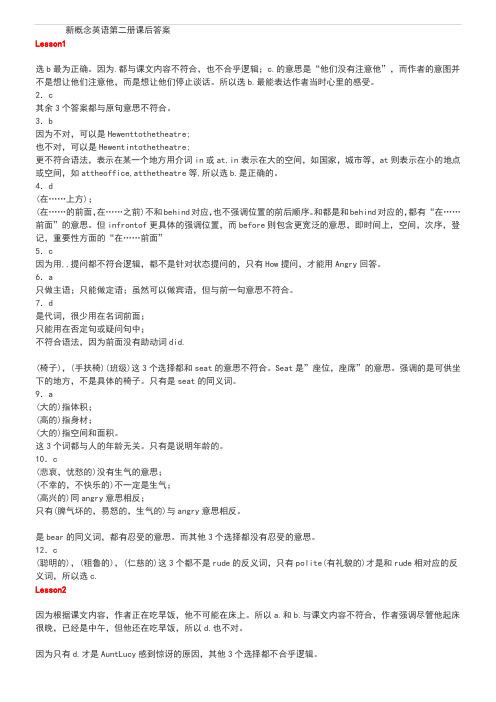
新概念英语第二册课后答案Lesson1选b最为正确。
因为.都与课文内容不符合,也不合乎逻辑;c.的意思是“他们没有注意他”,而作者的意图并不是想让他们注意他,而是想让他们停止谈话。
所以选b.最能表达作者当时心里的感受。
2.c其余3个答案都与原句意思不符合。
3.b因为不对,可以是Hewenttothetheatre;也不对,可以是Hewentintothetheatre;更不符合语法,表示在某一个地方用介词in或at,in表示在大的空间,如国家,城市等,at则表示在小的地点或空间,如attheoffice,atthetheatre等,所以选b.是正确的。
4.d(在……上方);(在……的前面,在……之前)不和behind对应,也不强调位置的前后顺序。
和都是和behind对应的,都有“在……前面”的意思。
但infrontof更具体的强调位置,而before则包含更宽泛的意思,即时间上,空间,次序,登记,重要性方面的“在……前面”5.c因为用,,提问都不符合逻辑,都不是针对状态提问的,只有How提问,才能用Angry回答。
6.a只做主语;只能做定语;虽然可以做宾语,但与前一句意思不符合。
7.d是代词,很少用在名词前面;只能用在否定句或疑问句中;不符合语法,因为前面没有助动词did.(椅子),(手扶椅)(班级)这3个选择都和seat的意思不符合。
Seat是”座位,座席”的意思。
强调的是可供坐下的地方,不是具体的椅子。
只有是seat的同义词。
9.a(大的)指体积;(高的)指身材;(大的)指空间和面积。
这3个词都与人的年龄无关。
只有是说明年龄的。
10.c(悲哀,忧愁的)没有生气的意思;(不幸的,不快乐的)不一定是生气;(高兴的)同angry意思相反;只有(脾气坏的,易怒的,生气的)与angry意思相反。
是bear的同义词,都有忍受的意思。
而其他3个选择都没有忍受的意思。
12.c(聪明的),(粗鲁的),(仁慈的)这3个都不是rude的反义词,只有polite(有礼貌的)才是和rude相对应的反义词,所以选c.Lesson2因为根据课文内容,作者正在吃早饭,他不可能在床上。
(完整版)新概念英语第二册课后习题(超全)
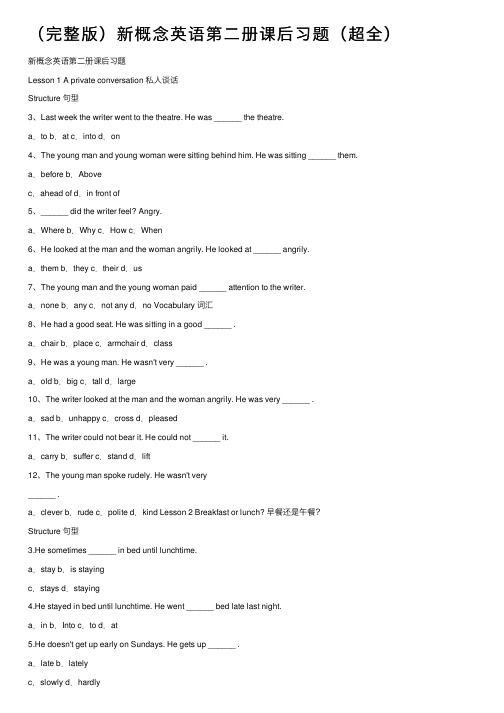
(完整版)新概念英语第⼆册课后习题(超全)新概念英语第⼆册课后习题Lesson 1 A private conversation 私⼈谈话Structure 句型3、Last week the writer went to the theatre. He was ______ the theatre.a.to b.at c.into d.on4、The young man and young woman were sitting behind him. He was sitting ______ them. a.before b.Abovec.ahead of d.in front of5、______ did the writer feel? Angry.a.Where b.Why c.How c.When6、He looked at the man and the woman angrily. He looked at ______ angrily.a.them b.they c.their d.us7、The young man and the young woman paid ______ attention to the writer.a.none b.any c.not any d.no Vocabulary 词汇8、He had a good seat. He was sitting in a good ______ .a.chair b.place c.armchair d.class9、He was a young man. He wasn't very ______ .a.old b.big c.tall d.large10、The writer looked at the man and the woman angrily. He was very ______ .a.sad b.unhappy c.cross d.pleased11、The writer could not bear it. He could not ______ it.a.carry b.suffer c.stand d.lift12、The young man spoke rudely. He wasn't very______ .a.clever b.rude c.polite d.kind Lesson 2 Breakfast or lunch? 早餐还是午餐?Structure 句型3.He sometimes ______ in bed until lunchtime.a.stay b.is stayingc.stays d.staying4.He stayed in bed until lunchtime. He went ______ bed late last night.a.in b.Into c.to d.at5.He doesn't get up early on Sundays. He gets up ______ .6.______ did Aunt Lucy come? By train.a.When b.How c.Why d.Where7.The writer can't see Aunt Lucy ______ He's having breakfast.a.still b.now c.often d.always Vocabulary 词汇8.He ______ out of the window and saw that it was raining.a.looked b.Sawc.remarked d.watched9.Just then, the telephone rang. It rang ______ .a.at once b.immediatelyc.again d.at that moment10.She was his aunt, so he was her ______ .a.son b.grandsonc.nephew d.niece11.Breakfast is the first ______ of the day.a.food b.dinner c.lunch d.meal12.Aunt Lucy said, ‘Dear me, ’ because she was ______ .a.angry b.Surprisedc.tired d.pleasedLesson 3 Please send me a card 请给我寄⼀张明信⽚Structure 句型/doc/24c9eb2d091c59eef8c75fbfc77da26924c59663.html st week he went to Italy. He was _________ Italy last summer.a.atb.toc.ind.on4.____________ him a few words of Italian? The writer.a.Who taughtb.Who did teachc.What did he teachd.Whom did he teach5.He was a friendly waiter. He spoke to the writer _________.a.friendb.as friends6.The writer __________ a few lines, but he didn't understand a word.a.readsb.readc.redd.reading7.He spent the whole day in his room. He was in his room _________ day.a.the holeb.the allc.alld.all ofVocabulary 词汇8.A waiter usually works in a __________.a.public gardenb.shopc.restaurantd.private house9.The waiter lent him a book. He _______ a book from the waiter.a.lentb.borrowedc.tookd.stole10.On the last day he made a big decision. It was the _______ day of his holiday.a.finalb.end/doc/24c9eb2d091c59eef8c75fbfc77da26924c59663.html testd.bottom11.He made a big decision. He _________.a.thought about itb.made up his mindc.changed his mindd.made a wish12.He didn't write a single card. So he __________.a.wrote only oned.wrote all the cards except one☆Lesson 4 An exciting trip 激动⼈⼼的旅⾏Lesson 5 No wrong numbers ⽆错号之虞3.Mr.Scott has a garage. The garage is .A.to himB.of himC.of hisD.his4.Mr.Scott cannot get a telephone for his garage._______he has just bought twelve pigeons.A.That's soB.That's whyC.BecauseD.For5.He has just bought twelve pigeons. When did he_______them?A.boughtB.buysC.buyD.buying6.What's the distance from Pinhurst to Silbury?How_______is Pinhurst_______Silbury?A.long ago ... untilB.long ... awayC.away ... tillD.far ... from7.The pigeon flew from one garage to theother_______three minutes.A.inB.intoC.withD.on8.Mr.Scott has a garage in Silbury. His_______garageis in Pinhurst.A.anotherD.different9.Mr.Scott can't get a telephone. Telephones arehard to .A.takeB.receiveC.obtainD.find10.He has sent requests for spare parts. He has spare parts.A.askedB.asked forC.beggedD.pleased11.Urgent messages are important, so they must besent .A.quicklyB.slowlyC.byhand /doc/24c9eb2d091c59eef8c75fbfc77da26924c59663.html rgely 12.Mr.Scott's ‘telephone service' is private. Itis .A.generalB.spareC.secretD.his ownLesson 6 Percy buttons 珀西·巴顿斯3.The writer has just moved to a new house. Shewas_______yesterday.A.at houseB.to the houseC.at homeD.in the home4.She gave .A.to him a mealD.a meal to him5.A neighbor told me about him. He PercyButtons was a beggar.A.toldB.said meC.told to meD.said6.Everybody knows him. know him.A.They allB.EachC.EveryD.All they7. does he call? Once a month.A.How seldomB.How longC.How soonD.How often8.A beggar is a person who .A.asks for money but doesn't workB.asks for foodC.works hardD.is out of work9.You can have a meal .A.only in the morningB.at any timeC.only at middayD.only in the evening10.She gave him a piece of cheese. He put the_______of cheese in his pocket.A.bitB.barC.blockD.packet11.He calls at every house in the street. He_______everyone.C.cries out atD.visits12.All the houses in our are the same age and size.A.streetB.wayC.roadD.routeLesson 7 Too late 为时太晚3. were detectives waiting? At the airport.A.WhyB.WhenC.WhereD.What4. were they expecting? A valuable parcel of diamonds.A.WhyB.WhenC.WhereD.What5.Someone had told the police that thieves would try to steal the diamonds. This happened the plane arrived.A.beforeB.afterC.whenD.as soon as6.The detectives went into the building and waited .A.inB.intoC.insideD.for7.Two men took the parcel, off the plane. They .A.took off itB.it took offC.took offD.took it offB.waitingC.expecting forD.expecting to9.The parcel was valuable. It was .A.worthB.worthyC.preciousD.value10.The thieves wanted to the diamonds.A.robB.stealC.take fromD.take to11.The detectives waited inside the main building.This was the building.A.most importantB.smallestC.firstD.greatest12.Someone had filled the parcel with stones and sand.It was stones and sand.A.full withB.full ofC.full byD.full inLesson 8 The best and the worst 最好的和最差的3.Bill Frith's garden is larger than Joe's. Itis_______./doc/24c9eb2d091c59eef8c75fbfc77da26924c59663.html rger garden B.a large garden/doc/24c9eb2d091c59eef8c75fbfc77da26924c59663.html rge garden /doc/24c9eb2d091c59eef8c75fbfc77da26924c59663.html rgest garden 4.Bill is a hard worker. He works than Joe.C.more hardlyD.hardier5.Joe's garden is more interesting_______Bill's.A.byB.forC.thanD.from6.The writer is fond of gardens.A.They like himB.They like to himC.He likes themD.He likes7.Joe's garden is the best in the town. It's the best them all.A.inB.ofC.forD.by8.Joe wins every time. He always BillFrith.A.winsB.beatsC.gainsD.earns9.Joe grows more flowers. More flowers inhis garden.A.growB.grow tallC.grow upD.grow big10.Joe's garden is interesting. Joe is in gardening.A.interestingB.interestC.interestinglylook after a garden.A.a hard workB.a hard jobC.hard jobD.hardly a job 12.Every year the writer enters for the garden competitionA.veryB.alsoC.andD.eitherLesson 9 A cold welcome 冷遇3.They went to the Town Hall on Wednesday evening. They went .A.the eveningB.on the eveningC.eveningD.in the evening4.The people under the Town Hall clock.A.wereB.wasC.isD.be5. will it strike? In twenty minutes'time.A.WhenB.How longC.How long agoD.How much 6.What time did it stop? five to twelve. A.OnB.AtC.InD.During7.Did happen? No, nothing happened. A.nothing B.anything C.anyD.a thing 8.How many times did the clock .A.hitB.beatC.knockC.passedD.pasted10.A clock usually has two hands, a minute hand and hand.A.a secondB.an hourC.a timeD.a big11.Most people wear or carry . A.an alarm clock B.an alarm C.a clock D.a watch12.It refused to welcome the New Year. It . A.denied it B.wanted to C.didn't want to D.wished to Lesson 10 Not for jazz 不适于演奏爵⼠乐 3.Our clavichord is kept in the living room. That's where we it.A.keptB.have keptC.are keepingD.keep4.It has belonged to our family for years. It'sthe .A.familiesB.families'C.family'sD.familys'5.The family have had the clavichord many years.A.sinceB.forC.fromD.by 6.Who it? Grandfather did. A.buyB.was boughtC.boughtD.did buy7.We are not allowed to touch it.We ______ touch it. a.mustn'tb.mustn't toc.haven't tod.don't have to 8.What's it ? A clavichord.A.toldB.saidD.spoken 9.It's kept in the living room.That's where we __ it. A.have B.holdC.liftD.carry 10.The visitor damaged it.She ______ it.A.hurtB.painedC.brokeD.destroyed 11.Recently itwasdamaged. Shedamagedit ./doc/24c9eb2d091c59eef8c75fbfc77da26924c59663.html te/doc/24c9eb2d091c59eef8c75fbfc77da26924c59663.html stly/doc/24c9eb2d091c59eef8c75fbfc77da26924c59663.html telyD.finally12.A friend of my father's is the clavichord. A.mendingB.makingC.doingD.building☆Lesson 11 One good deserves another 礼尚往来 Lesson 12 Goodbye and good luck 再见,⼀路顺风 9.It has sailed across the Atlantic many times.It has sailed across the Atlantic ______ .A.sometimesB.alwaysC.often/doc/24c9eb2d091c59eef8c75fbfc77da26924c59663.html ually☆Lesson 13. The Greenwood Boys 绿林少年Lesson 14. Do you speak English? 你会讲英语吗? Structure 句型3.What kind of car did he ______ ? a .drive b .drove c .drivend .driving4.As soon as he had got into the car, I said good morning. I said good morning ______ he had got into the car.a .Beforeb .a long time afterc .just afterd .a moment before 5‘Good morning,’I ______ .b .talkedc .toldd .said6.I speak a few words of French. I don't know ______French.a .manyb .muchc.plenty of d.a little7.Neither of us spoke. We ______ .a.neither spoke b.either spokec.both didn't speak d.neither didn't speakVocabulary词汇8.On the way, a young man waved to me. This happened ______ . a.before the writer's journeyb.during the writer's journeyc.after the writer's journeyd.a long time ago9.The young man waved to the writer. He ______ him.a.saluted b.greetedc.signalled to d.nodded10.He asked for a lift. He was a ______.a.tramp b.hitch hikerc.passenger d.foreigner11.He replied in French. He ______ the writer in French. a.responded b.answeredc.returned d.remarked12.The writer had ______ reached the town when the young man spoke. a.often b.almostc.sometimes d.just asLesson 15 Good news 佳⾳Structure 句型3‘Mr. Harmsworth ______ see you,’the secretary said.a.Would b.shallc.Will d.could4.______ did he feel? Very nervous.a.What b.Howc.How much d.Which5.The firm couldn't pay ______ large salaries.a.so b.such ac.such d.a such6.______ turn is it? It's your turn.a.Which b.To whomc.Whom d.Whose7‘Mr. Harmsworth,’I said ______ a weak voice.a.in b.withc.on d.underVocabulary 词汇8.Mr. Harmsworth wanted to see me. He wanted to______ me.a.watch b.look atc.look for d.speak to9.I felt nervous because I felt ______ .a.angry b.crossc.anxious d.ill10.It's your turn. ______ .a.It's your line b.It's your rowc.You're next d.It's your chance11.Don't interrupt!Don't ______ .a.speak b.talkc.talk while I'm talking d.cut off12.The writer would receive an extra £1, 000.a year. He would get£1, 000.a year ______ . a.less b.morec.over d.upLesson 16 A polite request 彬彬有礼的要求Structure 句型3.If you park your car in the right place you ______ receive a ticket.a.will b.wouldn'tc.didn't d.won't4.Traffic police never let you ______ without a ticket.a.go b.to goc.going d.have gone5.We welcome you to our city. You ______ to our city. a.welcome b.are welcomec.have welcomed d.are welcoming6‘No Parking’means ______ .a.don't leave your car hereb.without parkingc.don't stopd.there's no room to park here7.This note is only a reminder. It's ______ .a.nothing b.no onec.nothing extra d.nothing moreVocabulary 词汇8.This is a‘No Parking’area. Cars aren't allowed in this ______ . a.district b.countryc.surrounding d.kingdom9.You will enjoy your stay. It will ______ you.a.amuse b.enjoyc.laugh at d.please10.You will enjoy your stay. How long will you ______ here? a.rest b.prevent c.sit d.remain11.This note is only a reminder. It will help ______ .a.you remind b.your souvenirc.your remembrance d.you to remember12.You cannot fail to obey it. You can't ______ to do this. a.refuse b.denyc.resist d.withdrawLesson 17 Always young 青春常驻Structure 句型3.She must be at least thirty-five years old. In my opinion she ______ .a.hasb.isc.cand.must4.______is she?At least thirty-five years old.A.HowB.How bigC.How muchD.How old5.she must appear in a bright red dress.She will be dressed ______ red.A.withB.onC.inD.by6.she must appear in a bright red dress.That's what she ______ .A.has doneB.have to doC.has to doD.had done7.She had to wear short socks. It was ______ for her to wear them.a.certainb.necessaryc.importantd.impossibleVocabulary 词汇8.She often appears as a young girl. She ______ on the stage as a young girl.a.is presentedb.pointsc.showd.seems9.We went to the theatre to see a ______ .A.playB.gameC.toyD.match10.Jennifer will take part in the play.She______ it.a. will writeb. won't be inc. will be ind. will produce11.Men usually wear ______ .a.socks instead of stockingsb.stockings instead of socksc.either socks or stockingsd.neither socks nor stockings12.She is grown up. She is ______ .a.very oldb.an adolescentc.a teenaged.an adultLesson 18 He often does this! 他经常⼲这种事!Structure 句型3.After I had lunch . . . After I had ______ it . . .a.paid for b.eaten c.kept d.bought4.She couldn't find her bag. It wasn't ______ .a.their b.theirsc.they're d.there5.______I was looking for it, the landlord came in. a.Because b.While c.But d.Even if6.I haven't got a bag. I don't ______ one.a.get b.buy c.own d.owe7.My dog had taken it into the garden. It was ______ the garden. a.to b.Into c.at d.inVocabulary 词汇8.I looked for my bag. I ______ it.a.tried to look after b.tried to look atc.tried to find d.let9.I had left it on the chair. That's where I ______ it.a.put b.Let c.allowed d.permitted10.The chair was beside the door. It was ______ it.a.near b.far from c.next to d.besides11.The landlord returned with my bag. He ______ quickly. a.turned b.turned backc.came back d.turned round12.He gave it back to me. He ______ to me.a.turned it b.returned itc.turned it back d.turned it roundLesson 19 Sold out 票已售完Structure句型3.The play may begin at any moment. It ______ .a.has begunb.won't begin for a long timec.hasn't begun yetd.began a long time ago4.May I have two tickets please? ______ two tickets please? a.You must give meb.You have got to give mec.Could I haved.You may give me5.May I have two tickets? Please let me ______ two tickets. a.having b.to havec.had d.have6.The performance ______ next Wednesday.a.was b.will bec.shall be d.has been7.I might as well have them. I am ______ to have them. a.very pleased b.very gladc.not very glad d.delightedVocabulary词汇8.I hurried to the ticket office. I ______ .a.went there b.went there quicklyc.went there slowly d.didn't go there9.‘What a pity!’ Susan exclaimed. Susan was ______ . a.pleased b.glad c.sorry d.amused10.Can I return these tickets? I want to ______ .a.give them back b.give them inc.give them up d.give them off11.‘Certainly, ’ the girl said. ‘ ______ ’ the girl said.a.Off course b.Coursec.Of course d.Surely not12.Do you still want them? Do you want them ______ ? a.yet b.even c.now d.moreLesson20 One man in a boat 独坐孤⾈Structure句型3.______ is your favourite sport?Fishing.A.WhoB.WhichC.WhomD.Whose4.He doesn't catch anything.He nevercatches________.A.nothingB.anythingC.somethingD.everything5.I am even less lucky.I am_____ lucky.A.moreB.asC.not soD.so6.His bag is empty.He has______.A.a empty bagB.an empty bagC.empty bagD.one empty bag7.I an only interested in doingnothing.That's_____I'm interested in.A.onlyB.the oneC.allD.the onlyVocabulary词汇8.Fishing is my favourite sport.It is_______A.the one I like bestB.preferC.my bestD.the best9.A fisherman usually _____ fish .A.buysB.sellsC.tries to catchD.keeps10.He never_____any fish.A.holdsB.takes hold ofC.catchesD.takes11.He always goes ______with an empty bag.A.to homeB.to houseC.to the houseD.home12.You must give up fishing .You must_____.A.stopB.beginC.surrenderD.end☆Lesson 21 Mad or not?是不是疯了?Structure句型3.Passing planes can be heard night and day.You ______ them all the time.A.can headB.can to hearC.can hearD.can be heard4.It couldn’t be used then.It wasn’t ______ to use it.A.ableB.I'm sureC.impossibleD.possible5.Over a hundred people must have been driven away.()they were.A.I thinkB.I'm sureC.CertainD.Of course6.I am one of the few people left. So there().A.are none leftB.is one leftC.are some leftD.are a lot left7.How much()? A large sum of money.A.you have been offeredB.have you been offeredC.you have offereD.D.they offered youVocabulary词汇8.I have been offered some money. They want to()me some money.A.serveB.giveC.takeD.make9.I have been offered a large()of money.A.amountB.numberC.someD.piece10.I am determined to stay here. I()stay here.A.am will toB.want toC.mayD.am going to11.Everyone says I must be mad and they are probably right.()they are.A.Of courseB.It's certainC.PerhapsD.It's sure12.Everyone says I must be mad and that is probably ().A.justB.fairC.correctD.equal☆Lesson 22 A glass envelope 玻璃信封Structure句型3.Jane never dreamed()a letter.A. to receiveB. receivingC. of receiveD. that she would receive4.She received a letter from a girl of her own age. The girl is()she is.A.the same age withB.the same ageC.as oldD.the same age as5.Did she the bottle into the sea? ()A.threwB.throwC.thrownD.throwing6.She never thought()it again.A.forB.toC.atD.about7.The girls write()regularly now.A.to one anotherB.the one to the otherC.each to otherD.to otherVocabulary词汇8.We were travelling across the Channel. We went on a()across the Channel.A.sailB.travelC.tripD.run9.Jane wrote her name and address on a()of paper.A.lumpB.barC.tubeD.sheet10.Both girls often write to each other now. They write().A.frequentlyB.occasionallyC.sometimesD.hurriedly11.You can buy()at the post office.A.sweetsB.stampsC.applesD.now and again12.They will travel faster. They will travel().A.soonerB.more quicklyC.hurriedlyD.shorter☆Lesson 23 A new house 新居11.Work on it had begun before my sister left. My sister left()it begun.A.afterB.withoutC.behindD.soon12.It is a very modem house. It was built()./doc/24c9eb2d091c59eef8c75fbfc77da26924c59663.html stly /doc/24c9eb2d091c59eef8c75fbfc77da26924c59663.html te /doc/24c9eb2d091c59eef8c75fbfc77da26924c59663.html testD.recently☆Lesson 24. If could be worse 不幸中之万幸Structure 句型3.The money ______ in his room.a.was b.were c.are d.has4.He could do nothing. He couldn't do ______ .a.something b.nothingc.anything d.everything5.A knock at the door ______ him.a.interrupted b.was interruptedc.interrupting d.was interrupting6.Where did she find the money? ______ the room.a.Outside b.Out ofc.Out d.Without7.______ room was it? This gentleman's.a.To whom b.Whoc.Whose d.Of whomVocabulary 词汇8.The writer had lost his money. He felt upset. He must have been ______ . a.sick b.ill c.worried d.tired9.The manager was sympathetic ______ .a.Everyone liked himb.He liked everyonec.He was sorry for the writerd.He liked the writer10.He lost his money. His money was ______ .a.losing b.Missingc.going away d.disappearing11.You can't post this letter without ______ .a.an envelope b.a packetc.some string d.a pen12.The girl returned the money. She was very ______ . a.honourable b.Honestc.honoured d.trusting。
新概念英语第二册课后练习答案lesson1
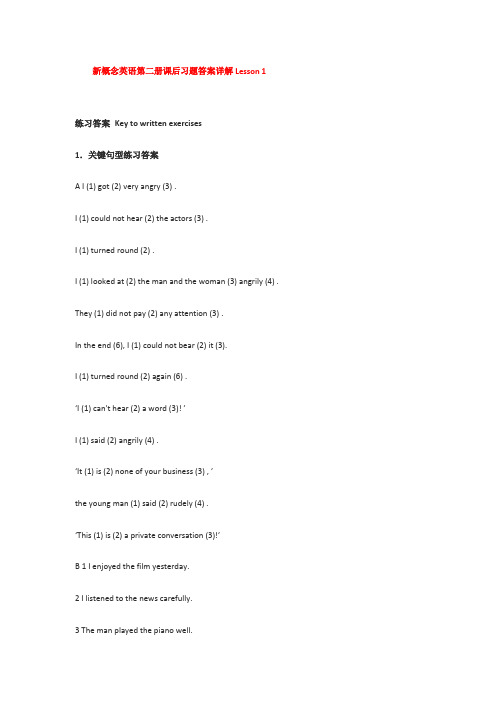
新概念英语第二册课后习题答案详解Lesson 1练习答案Key to written exercises1.关键句型练习答案A I (1) got (2) very angry (3) .I (1) could not hear (2) the actors (3) .I (1) turned round (2) .I (1) looked at (2) the man and the woman (3) angrily (4) . They (1) did not pay (2) any attention (3) .In the end (6), I (1) could not bear (2) it (3).I (1) turned round (2) again (6) .‘I (1) can't hear (2) a word (3)! ’I (1) said (2) angrily (4) .‘It (1) is (2) none of your business (3) , ’the young man (1) said (2) rudely (4) .‘This (1) is (2) a private conversation (3)!’B 1 I enjoyed the film yesterday.2 I listened to the news carefully.3 The man played the piano well.4 The children played games quietly in their room yesterday.5 He opened the door quietly.6 He left immediately.7 He planted a tree in the corner of the garden.8 He read the letter quickly in his office before lunch.9 I borrowed a book from the library this morning.10 The cook spoilt the soup.11 We stay at home on Sundays.12 There are a lot of people at the bus stop.13 The little boy ate greedily an apple in the kitchen this morning.14 She draws beautifully.15 I like music very much.16 They built a new school in our village last year.17 The match ended at four o'clock.18 She received a letter from her brother last week.2.多项选择题答案1. b选b最为正确。
新概念英语第二册测验答案.1-1doc1
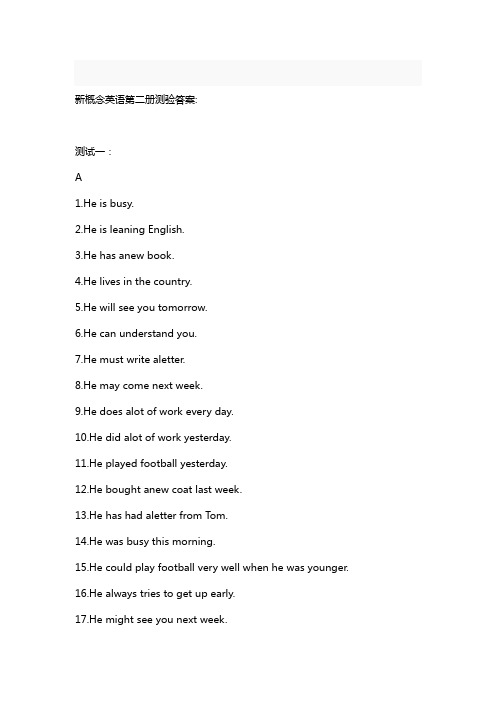
新概念英语第二册测验答案:测试一:A1.He is busy.2.He is leaning English.3.He has anew book.4.He lives in the country.5.He will see you tomorrow.6.He can understand you.7.He must write aletter.8.He may come next week.9.He does alot of work every day.10.He did alot of work yesterday.11.He played football yesterday.12.He bought anew coat last week.13.He has had aletter from Tom.14.He was busy this morning.15.He could play football very well when he was younger.16.He always tries to get up early.17.He might see you next week.18.He always enjoys agood film.19.He had finished his work before you came.20.He watches television every night.B1.some2.a3.any4.any5.a6.some7.a8.any9.any 10.anyC1.I haven’t got much butter.2.You haven’t got many cigarettes.3.We haven’t got much milk.4.She hasn’t got many biscuits.5.They haven’t got much stationery.D1.bought2.aired3.lost4.listened5.emptiedE1.Q.Did he buy anew car?Q.What did he buy?N.He didn’t buy anew car.2.Q.Can she come tomorrow?Q.When can she come?N.She can’t come tomorrow.3.Q.Were they here yesterday?Q.When were they here?N.They weren’there yesterday.4.Q.Must he leave early?Q.Why must he leave early?N.He mustn’t leave early.5.Q.Did he give you apen?Q.What did he give you?N.He didn’t give you apen.6.Q.Does he live next door?Q.Where does he live?N.He doesn’t live next door.7.Q.Do you know him well?Q.How well do you know him?N.You don’t know him well.8.Q.Has he found his pen?Q.What has he found?N.He hasn’t found his pen.9.Q.Did you see that film?Q.When did you see that film?N.You didn’t see that film.10.Q.Did he arrive at two o’clock?Q.When did he arrive?N.He didn’t arrive at two o’clock.F1.slowlyzily3.badly4.carefully5.suddenlyG1.He’ll.2.She’ll.3.I’ll.4.He won’t.5.We shan’t.1.his2.mine3.hers4.theirs5.yoursI1.cooler2.wetterter4.easier5.more expensiverger7.more interesting8.prettier9.more beautiful 10.more intelligentJ1.yesterday2.tomorrow3.today4.this afternoon5.the day after tomorrow6.the day before yesterdayst night8.tomorrow morning9.this morning 10.yesterday afternoonK1.at2.on3.in4.in5.onL1.over2.under3.across/in4.along5.on6.in7.off8.between9.into 10.out ofM1.Which2.Who3.Which4.Who5.Which1.This is the car which the mechanic repaired yesterday.2.He is the man whom Iinvited to the party.3.These are the things which Ibought yesterday.4.He is the man who came here last week.5.He is the policeman who caught the thieves.6.She is the nurse who looked after me.7.She is the woman whom Imet yesterday.8.I am the person who wrote to you.9.They are the people whom Isaw yesterday.10.They are the trees which we cut down yesterday.O1.knives2.boxes3.shelves4.wives5.dishesP1.No,I didn’t.I took her to aparty.2.Yes,I did.3.She sat near the window.4.A middle-aged lady(came into our compartment).5.She was middle-aged.6.She sat opposite Sally.7.She said"Hello"to Sally.8.To make herself beautiful.(She did it to make herself beautiful.)9.No,she didn’t.She thought she was ugly.10.She said,"But you are still ugly."(She said she was still ugly.)。
(完整版)新概念英语2册开头测试答案
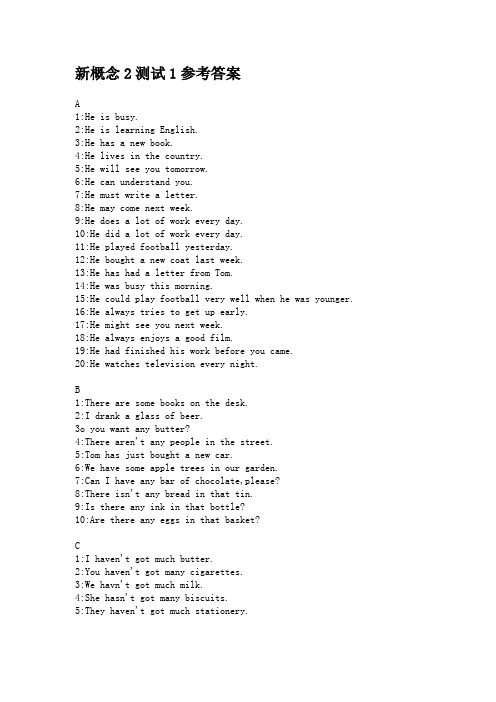
新概念2测试1参考答案A1:He is busy.2:He is learning English.3:He has a new book.4:He lives in the country.5:He will see you tomorrow.6:He can understand you.7:He must write a letter.8:He may come next week.9:He does a lot of work every day.10:He did a lot of work every day.11:He played football yesterday.12:He bought a new coat last week.13:He has had a letter from Tom.14:He was busy this morning.15:He could play football very well when he was younger. 16:He always tries to get up early.17:He might see you next week.18:He always enjoys a good film.19:He had finished his work before you came.20:He watches television every night.B1:There are some books on the desk.2:I drank a glass of beer.3o you want any butter?4:There aren't any people in the street.5:Tom has just bought a new car.6:We have some apple trees in our garden.7:Can I have any bar of chocolate,please?8:There isn't any bread in that tin.9:Is there any ink in that bottle?10:Are there any eggs in that basket?C1:I haven't got much butter.2:You haven't got many cigarettes.3:We havn't got much milk.4:She hasn't got many biscuits.5:They haven't got much stationery.D1:He bought a new car last year.2:She aired it this morning.3:He lost his pen this morning.4:He listened to the news yesterday. 5:She emptied it yesterday.E1:He bought a new car.Did he buy a new car?What did he buy?He didn't buy a new car.2:She can come tomorrow.Can she come tomorrow?When can she come?She can't come tomorrow.3:They were here yesterday.Were they here yesterday?When were they here?They weren't here yesterday.4:He must leave early.Must he leave early?Why must he leave early?He mustn't leave early.5:He gave you a pen.Did he give you a pen?What did he give you?He didn't give you a pen.6:He lives next door.Does he live next door?Where does he live?He doesn't live next door.7:You know him well.Do you know him well?How well do you know him?You don't know him well.8:He has found his pen.Has he found his pen?What has he found?He hasn't found his pen.9:You saw that film.Did you see that film?When did you see?You didn't see that film.。
(完整版)新概念英语第二册课后习题答案详解
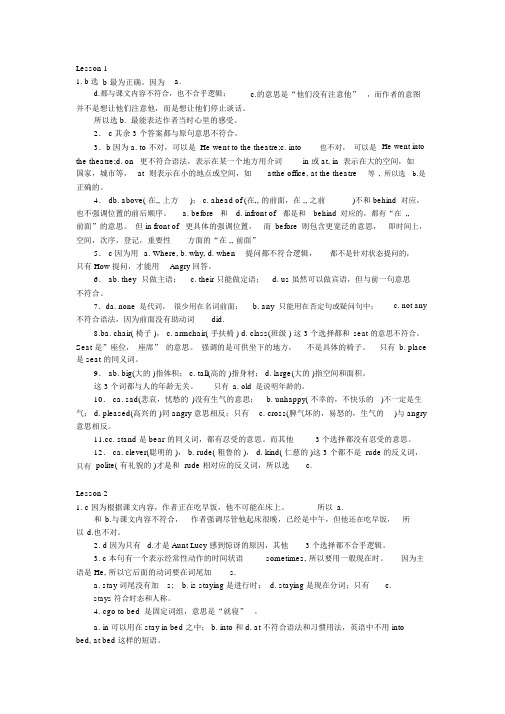
Lesson 11. b 选 b 最为正确。
因为 a.d.都与课文内容不符合,也不合乎逻辑; c.的意思是“他们没有注意他”,而作者的意图并不是想让他们注意他,而是想让他们停止谈话。
所以选 b. 最能表达作者当时心里的感受。
2. c 其余 3 个答案都与原句意思不符合。
3.b 因为 a. to 不对,可以是 He went to the theatre;c. into也不对,可以是He went into the theatre;d. on更不符合语法,表示在某一个地方用介词in 或 at, in 表示在大的空间,如国家,城市等,at 则表示在小的地点或空间,如atthe office, at the theatre等,所以选 b.是正确的。
4. db. above( 在,, 上方); c. ahead of (在,, 的前面,在 ,, 之前)不和 behind 对应,也不强调位置的前后顺序。
a. before和 d. infront of都是和behind对应的,都有“在,,前面”的意思。
但 in front of更具体的强调位置,而before则包含更宽泛的意思,即时间上,空间,次序,登记,重要性方面的“在 ,, 前面”5. c 因为用 a. Where, b. why, d. when提问都不符合逻辑,都不是针对状态提问的,只有 How 提问,才能用Angry 回答。
6. ab. they只做主语; c. their 只能做定语; d. us 虽然可以做宾语,但与前一句意思不符合。
7.da. none是代词,很少用在名词前面; b. any只能用在否定句或疑问句中; c. not any 不符合语法,因为前面没有助动词did.8.ba. chair( 椅子 ), c. armchair( 手扶椅 ) d. class(班级 ) 这 3 个选择都和seat 的意思不符合。
Seat 是”座位,座席” 的意思。
新概念英语第二册第一课(包含课文、练习及答案)
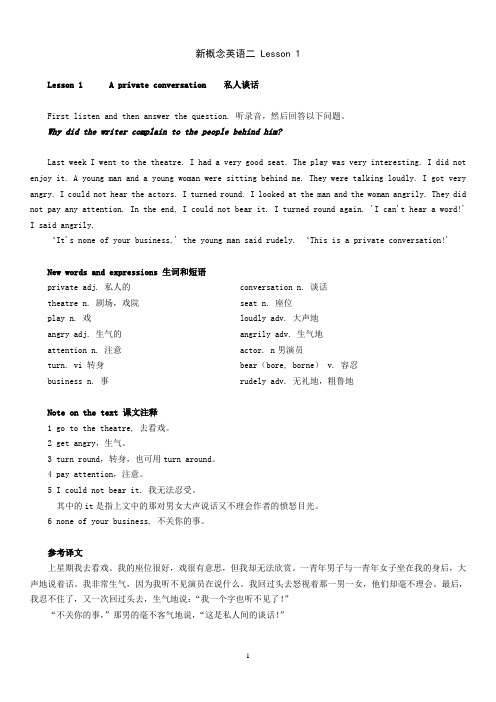
新概念英语二 Lesson 1Lesson 1 A private conversation 私人谈话First listen and then answer the question. 听录音,然后回答以下问题。
Why did the writer complain to the people behind him?Last week I went to the theatre. I had a very good seat. The play was very interesting. I did not enjoy it. A young man and a young woman were sitting behind me. They were talking loudly. I got very angry. I could not hear the actors. I turned round. I looked at the man and the woman angrily. They did not pay any attention. In the end, I could not bear it. I turned round again. 'I can't hear a word!' I said angrily.‘It's none of your business,' the young man said rudely. ‘This is a private conversation!'New words and expressions 生词和短语private adj. 私人的 conversation n. 谈话theatre n. 剧场,戏院 seat n. 座位play n. 戏 loudly adv. 大声地angry adj. 生气的 angrily adv. 生气地attention n. 注意 actor. n男演员turn. vi 转身 bear(bore, borne) v. 容忍business n. 事 rudely adv. 无礼地,粗鲁地Note on the text 课文注释1 go to the theatre, 去看戏。
- 1、下载文档前请自行甄别文档内容的完整性,平台不提供额外的编辑、内容补充、找答案等附加服务。
- 2、"仅部分预览"的文档,不可在线预览部分如存在完整性等问题,可反馈申请退款(可完整预览的文档不适用该条件!)。
- 3、如文档侵犯您的权益,请联系客服反馈,我们会尽快为您处理(人工客服工作时间:9:00-18:30)。
新概念英语第二册测验答案:
测试一:
A
1.He is busy.
2.He is leaning English.
3.He has anew book.
4.He lives in the country.
5.He will see you tomorrow.
6.He can understand you.
7.He must write aletter.
8.He may come next week.
9.He does alot of work every day.
10.He did alot of work yesterday.
11.He played football yesterday.
12.He bought anew coat last week.
13.He has had aletter from Tom.
14.He was busy this morning.
15.He could play football very well when he was younger.
16.He always tries to get up early.
17.He might see you next week.
18.He always enjoys agood film.
19.He had finished his work before you came.
20.He watches television every night.
B
1.some
2.a
3.any
4.any
5.a
6.some
7.a
8.any
9.any 10.any
C
1.I haven’t got much butter.
2.You haven’t got many cigarettes.
3.We haven’t got much milk.
4.She hasn’t got many biscuits.
5.They haven’t got much stationery.
D
1.bought
2.aired
3.lost
4.listened
5.emptied
E
1.Q.Did he buy anew car?Q.What did he buy?N.He didn’t buy anew car.
2.Q.Can she come tomorrow?Q.When can she come?N.She can’t come tomorrow.
3.Q.Were they here yesterday?Q.When were they here?N.They weren’t
here yesterday.
4.Q.Must he leave early?Q.Why must he leave early?N.He mustn’t leave early.
5.Q.Did he give you apen?Q.What did he give you?N.He didn’t give you apen.
6.Q.Does he live next door?Q.Where does he live?N.He doesn’t live next door.
7.Q.Do you know him well?Q.How well do you know him?N.You don’t know him well.
8.Q.Has he found his pen?Q.What has he found?N.He hasn’t found his pen.
9.Q.Did you see that film?Q.When did you see that film?N.You didn’t see that film.
10.Q.Did he arrive at two o’clock?Q.When did he arrive?N.He didn’t arrive at two o’clock.
F
1.slowly
zily
3.badly
4.carefully
5.suddenly
G
1.He’ll.
2.She’ll.
3.I’ll.
4.He won’t.
5.We shan’t.
1.his
2.mine
3.hers
4.theirs
5.yours
I
1.cooler
2.wetter
ter
4.easier
5.more expensive
rger
7.more interesting
8.prettier
9.more beautiful 10.more intelligent
J
1.yesterday
2.tomorrow
3.today
4.this afternoon
5.the day after tomorrow
6.the day before yesterday
st night
8.tomorrow morning
9.this morning 10.yesterday afternoon
K
1.at
2.on
3.in
4.in
5.on
L
1.over
2.under
3.across/in
4.along
5.on
6.in
7.off
8.between
9.into 10.out of
M
1.Which
2.Who
3.Which
4.Who
5.Which
1.This is the car which the mechanic repaired yesterday.
2.He is the man whom Iinvited to the party.
3.These are the things which Ibought yesterday.
4.He is the man who came here last week.
5.He is the policeman who caught the thieves.
6.She is the nurse who looked after me.
7.She is the woman whom Imet yesterday.
8.I am the person who wrote to you.
9.They are the people whom Isaw yesterday.
10.They are the trees which we cut down yesterday.
O
1.knives
2.boxes
3.shelves
4.wives
5.dishes
P
1.No,I didn’t.I took her to aparty.
2.Yes,I did.
3.She sat near the window.
4.A middle-aged lady(came into our compartment).
5.She was middle-aged.
6.She sat opposite Sally.
7.She said"Hello"to Sally.
8.To make herself beautiful.(She did it to make herself beautiful.)
9.No,she didn’t.She thought she was ugly.
10.She said,"But you are still ugly."(She said she was still ugly.)。
